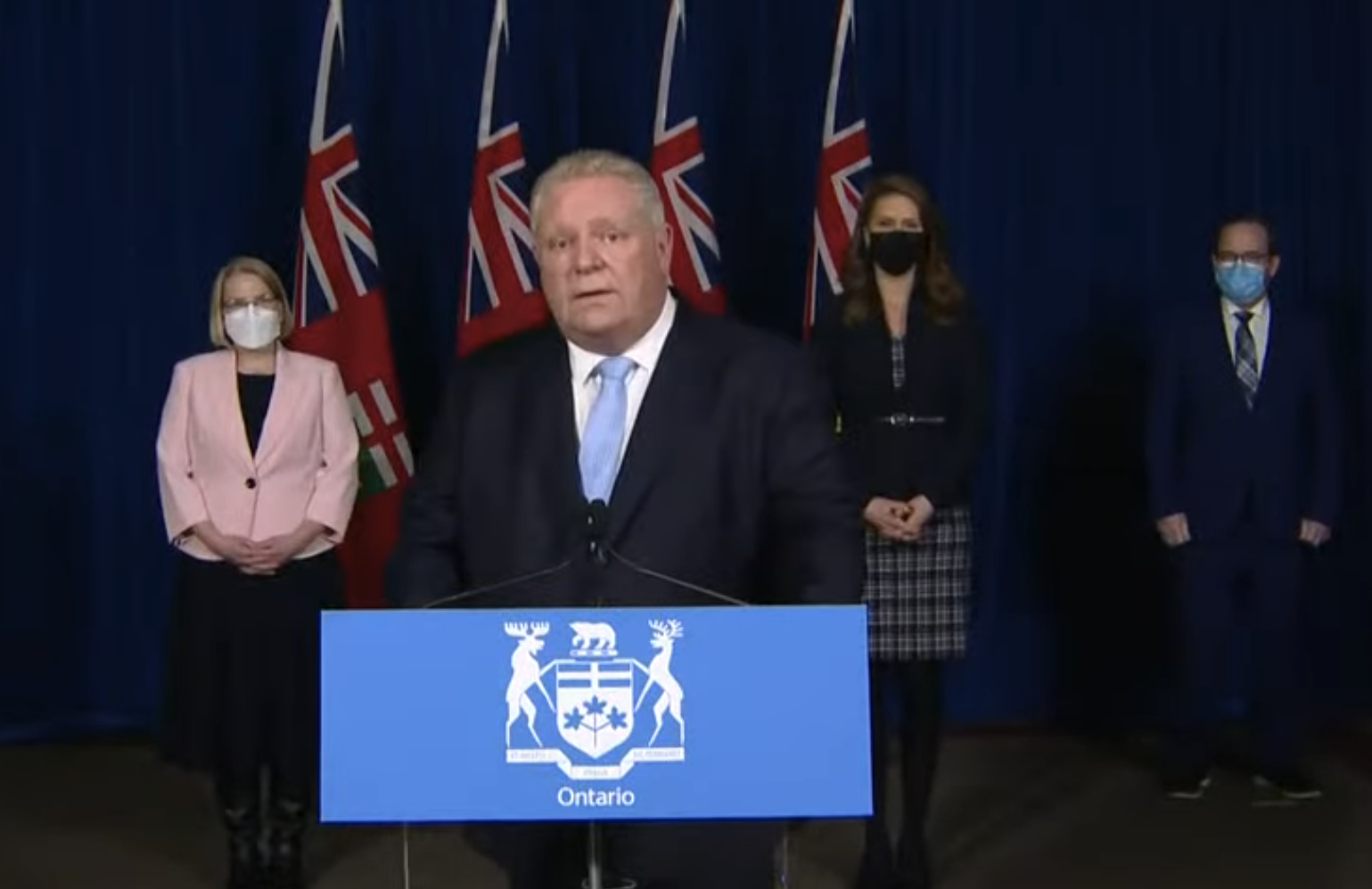TORONTO – Ontario Premier Doug Ford drew a line at Queen’s Park on Feb. 11, declaring a provincial state of emergency and pleading to protesters gathered in Ottawa and at critical Canadian border crossings to leave.
Frustrations have reached a “boiling point” for Canadians, Ford said, referring to the situation in downtown Ottawa as a “siege” and imploring protesters holding the city “hostage” to “please go home.”
“This is no longer a protest,” he said.
The premier acknowledged an inherent right to protest, but said no rights allow for the cutting off and targeting a “lifeline” of trade at border crossings.
“We will take whatever steps are necessary to ensure the borders reopen,” he asserted.
Ford focused his attention on the “very small groups” of anti-mandate, anti-government and anti-media people obstructing Canadian border crossings and the streets of Ottawa, saying they are forcing a political agenda through “disruption, intimidation and chaos.”
The right to make a political statement does not outweigh the right for “hundreds of thousands of workers to earn their living,” Ford explained, adding those in Ottawa have the right to live peacefully and without harassment.
The premier spoke of the “more than $700 million” of daily, two-way trade reliant on an open border crossing at the Ambassador Bridge in Windsor to underscore his point.
“That trade employs hundreds of thousands of Ontarians who work in auto plants and factories,” Ford said, adding that “99% of the truckers out there are working their backs off to put food on our table, to make sure parts get to the factories, [to] keep the economy going.”
Prime Minister Justin Trudeau’s government has faced mounting pressure from domestic and US business interest groups to get trade moving again as the Ambassador Bridge blockade enters its fifth day.
Yesterday, the Canadian Automotive Parts Manufacturers’ Association announced it would be going to court to seek an injunction on “establishing a blockade, or in any way impeding access” to the Ambassador Bridge.
Goldy Hyder, President and CEO of the Business Council of Canada, said in a Feb. 11 statement: “What started as a local protest has escalated into a national emergency” and said it’s “imperative that the federal government lead a nationally coordinated effort to clear the blockades and restore order.”
The U.S. Chamber of Commerce, National Association of Manufacturers and Business Roundtable issued a Feb. 10 statement urging “the Canadian government to act swiftly to address the disruption to the flow of trade and its impact on manufacturers and other businesses on both sides of the border.”
Trudeau condemned the “illegal blockades” on Twitter last night, stating that an Incident Response Group is working “closely with municipal and provincial governments to end these blockades, and to make sure they have the resources they need.”
State of emergency declared
“Today, I’m using my authority as premier of Ontario to declare a state of emergency in our province,” Ford said on Friday.
Cabinet will be meeting Saturday to “urgently” enact temporary orders penalizing blockades, with the goal of making them permanent through future legislation.
Those blocking or impeding the movement of goods, people and services along critical infrastructure could face fines up to $100,000 and up to a year of imprisonment, according to Ford.
He also stated commercial and personal driver’s licences could be revoked for anyone disrupting the travel and flow of goods and services.
Ford emphasized such measures would not prevent peaceful protest, but provide “additional tools to help stop the illegal occupation of Ottawa and the Ambassador Bridge in Windsor.”
“We’re taking these steps to do what is necessary to support our police as they do what it takes to restore law and order,” Ford said, reiterating the government doesn’t direct police forces, but does set the laws they enforce.
“The eyes of the world are upon us right now,” he noted, adding those remaining in Ottawa and at the Windsor crossing are a poor reflection of Canadians who are supposed to express themselves via the ballot box.
“As a province, as a nation, we must collectively draw a line, we must stand for the values that define us, we must come together right now, we must heal the divide that is fracturing our society,” he said.
At a press conference later in the day following Ford’s announcement, Prime Minister Justin Trudeau said he had spoken with Ford on Wednesday and called the measures announced today “responsible” and “necessary.”




